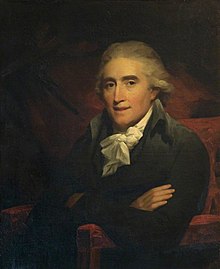Henry Erskine (lawyer)
Henry Erskine | |
|---|---|
 The Hon Henry Erskine by Henry Raeburn | |
| Lord Advocate | |
| In office 1783–1783 | |
| Monarch | George III |
| Prime Minister | The Duke of Portland |
| Preceded by | Henry Dundas |
| Succeeded by | Ilay Campbell |
| In office 1806–1807 | |
| Monarch | George III |
| Prime Minister | The Lord Grenville |
| Preceded by | Sir James Montgomery, Bt |
| Succeeded by | Archibald Colquhoun |
| Personal details | |
| Born | 1 November 1746 |
| Died | 8 October 1817 (aged 70) |
| Nationality | Scottish |
| Spouse(s) | (1) Christian Fullerton (d. 1804) (2) Erskine Munro |
| Alma mater | St Andrews University University of Edinburgh University of Glasgow |
The Honourable Henry Erskine (1 November 1746 – 8 October 1817) was a Scottish advocate and British Whig politician.
Background and education
[edit]Erskine was the third but second surviving son of Agnes, daughter of Sir James Steuart, 7th Baronet and his wife Anne (1687-1736), and Henry Erskine, 10th Earl of Buchan. He was the brother of David Erskine, 11th Earl of Buchan, and Lord Chancellor Thomas Erskine, 1st Baron Erskine.[1] His elder sister was Lady Anne Agnes Erskine who was involved with the evangelical methodists of Countess of Huntingdon's Connexion.[2] He was educated at the University of St Andrews (1760-1764), the University of Glasgow (1764-1766) and then to the University of Edinburgh in 1766.[3] He was described as "a tall and rather slender figure, a face sparkling with vivacity, a clear sweet voice, and general suffusion of elegance".[4]
Legal and political career
[edit]Erskine is considered the lawyer who effectively created the modern adversarial. He was considered a legendary orator compared by his contemporaries to Cicero.
Erskine served as Lord Advocate from 1783 to 1784 in the Fox-North Coalition and again from 1806 to 1807 in the Ministry of All the Talents. He was advocate and state councillor to the Prince of Wales in Scotland from 1783. He was Dean of the Faculty of Advocates from 1785 to 1795, but was not re-elected in 1796, due to his opposition to the war. Lord Cockburn, commenting on his replacement, observed that "it was the Faculty of Advocates alone that suffered".[5] Robert Burns wrote a ballad memorializing the vote entitled, "The Dean of Faculty".[6][7] In 1788, Erskine had the unenviable task of defending the celebrated Edinburgh thief Deacon Brodie.[5] Despite his best efforts, Brodie was sentenced to death.
In 1795 he was living at 68 Princes Street facing Edinburgh Castle[8] having moved there from George Square.[9]
Erskine sat as Member of Parliament for Haddington Burghs from April to November 1806,[10] and for Dumfries Burghs from 1806 to 1807.[11] He was appointed as a Commissioner to inquire into administration of justice in Scotland in 1808. In 1811 he gave up his practice at the bar and retired to his country residence of Almondell, in Linlithgowshire. It was said of him that "no poor man wanted a friend while Harry Erskine lived."[5] He published The Emigrant, an Eclogue, 1773 and other poems.[12]
Family
[edit]Erskine married firstly Christian, daughter of George Fullerton, in 1772. They lived at Shoemakers Close on the Canongate.[13] They had two sons and two daughters. Their eldest son, Henry, succeeded as 12th Earl of Buchan on his uncle's death in 1829. After Christian's death in May 1804 Erskine married as his second wife Erskine, daughter of Alexander Munro and widow of Sir James Turnbull, in 1805. This marriage was childless. Henry Erskine died in October 1817, aged 70.[1] A bust of Erskine by Peter Turnerelli stands in Parliament Hall in Edinburgh.[4]
References
[edit]Citations
[edit]- ^ a b thepeerage.com Hon. Henry Erskine
- ^ Graham, E. Dorothy (23 September 2004). "Erskine, Lady Anne Agnes (1739–1804), friend and trustee of Selina, countess of Huntingdon". Oxford Dictionary of National Biography. Vol. 1 (online ed.). Oxford University Press. doi:10.1093/ref:odnb/71064. ISBN 978-0-19-861412-8. (Subscription or UK public library membership required.)
- ^ Fry, Michael (23 September 2004). "Erskine, Henry (1746-1817), lawyer and politician". Oxford Dictionary of National Biography (online ed.). Oxford University Press. doi:10.1093/ref:odnb/8858. (Subscription or UK public library membership required.)
- ^ a b Monuments and Statues of Edinburgh, Michael T. R. B. Turnbull, (Chambers) p. 54
- ^ a b c "Trial of Deacon Brodie", William Roughead, 1906
- ^ Burns, Robert; Cunningham, Allan (1834). The Works of Robert Burns: With His Life. Hilliard, Gray and Company. p. 26. Retrieved 20 January 2018.
- ^ McCue, Kirsteen; Brown, Rhona. "Centre for Robert Burns Studies at the University of Glasgow" (PDF). University of Glasgow. Retrieved 20 January 2018.
- ^ Edinburgh Post Office Directory 1795
- ^ Edinburgh Post Office Directory 1785
- ^ Leigh Rayment's Historical List of MPs – Constituencies beginning with "H" (part 1)
- ^ Leigh Rayment's Historical List of MPs – Constituencies beginning with "D" (part 4)
- ^ "The Emigrant. An Eclogue". Weekly Magazine or Edinburgh Amusement. 31 (21 March 1776): 399–400. 16 January 2018.
- ^ Edinburgh and Leith Post Office Directory 1775
Sources
[edit]- Conolly, Matthew Forster (1866). Biographical dictionary of eminent men of Fife of past and present times : natives of the county, or connected with it by property, residence, office, marriage, or otherwise. Edinburgh: Inglis & Jack. pp. 170-174.
